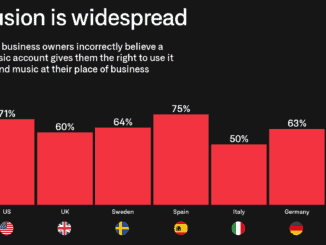
Stream ripping piracy continues to grow with the number of consumers acquiring unlicensed music in the US this way growing from 15 million in 2017 to 17 million in 2018. The figures come from a blog posting announcing the publishing of MusicWatch’s Annual Music Study. The use of legacy forms of piracy such as unlicensed download sites and Peer to Peer (P2P) file sharing applications have largely become a thing of the past but the use of websites and apps that facilitate the downloading of music licensed only for streaming is on the increase.
The report estimates that there are 17 million stream-rippers in the US during 2018, up from 15 million in 2017 which is more people than bought a new vinyl record last year. It goes on to say that the top 30% of stream-rippers are copying 112 files, on average – the equivalent of more than 10 full music albums.
MusicWatch consumer research shows that the main reasons cited by people who use stream-rippers are often to substitute for features offered by subscription music streaming services. This includes the ability to load files on their device for access to songs offline, and not having to pay for songs individually.
The research shows that stream-rippers are more likely to participate in other unsanctioned forms of music sharing such as downloading songs from unlicensed mobile apps, or sharing on digital lockers. Stream-rippers tend to be better educated and from higher income households, negating the excuse that piracy is driven by lack of financial resources. They are also more likely to go to the movies, play video games and subscribe to Netflix or Hulu.
A subset of MusicWatch research was published earlier this year on the RIAA website which shows patterns of music consumption (including stream-ripping) in Music Consumer Profile – 2018 which can be found here.
In the UK, PRS for Music conducted research into stream-ripping and found that:
- In nearly two years (Jan 2014 – September 2016), the use of stream-ripping services increased by 141.3%, dwarfing the growth seen for other types of music-specific infringing sites.
- In the time period of just one month, the use of stream ripping sites made up the majority (68.2%) of the total usage across the 50 most popular music-only infringing sites.
- Advertising is the main funding model associated with stream-ripping services.
- YouTube is by far the most popular source of content for stream-ripping services (used by 75 of the 80 services surveyed).
- 57% of those UK adults surveyed claimed to be aware of stream-ripping services.
- Those who claimed to have used a stream-ripping service were significantly more likely to be male, ABC1 social grade, and between the ages of 16 to 34 years.
- Within the reasons driving stream-ripping the most common response was that the music was already owned in another format (31%), with wanting to listen to music offline (26%) and on the move (25%) the next most commonly given responses. Unaffordability (21%) and feeling official content is overpriced (20%) coming in after these reasons.
This is similar to the US findings and show that in both countries stream-rippers are better educated and come from higher income households.
Further research on music copyright issues and the work of PRS Music in protecting musicians and composers’ rights can be found here.




